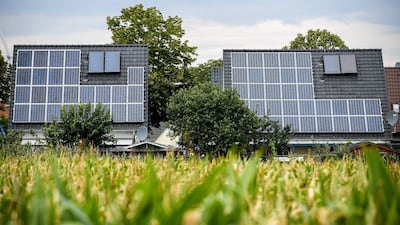The solar power industry is celebrating a boom after what it described as a “stellar performance” for the renewable energy source in 2021.
More solar panels were connected to Europe’s electricity grids than ever before, with a 34 per cent rise compared to the previous year, beating forecasts despite the setbacks of the pandemic.
Analysts said growing demand for clean power from climate-conscious governments and rising energy prices from other sources had boosted the business case for solar power.
Solar power in the EU “has again demonstrated a stellar performance in 2021 despite adverse market conditions on various fronts,” said a report by Solar Power Europe, an industry body.
“This growth makes 2021 not only another record year for solar in the EU … it was also the best year in history.”
Germany has by far the largest solar market in Europe, and plans to expand it further. The climate-friendly government that recently took office in Berlin is promising to install photovoltaic panels on every suitable new roof.
It came after the Cop26 climate summit produced an agreement to increase clean power generation to keep the target of limiting global warming to 1.5°C within reach.
Across the EU, solar power accounts for about 13 per cent of electricity generation. European Commission figures say the cost of installing solar panels has fallen by 85 per cent over the past decade.
However, some industries are hard to connect to solar panels, with ships and aeroplanes more likely to benefit from so-called “green hydrogen” that is generated indirectly from renewable sources.
The EU is planning to put green hydrogen at the heart of its climate plans, hoping that it will prevail in the market against dirtier fuels by 2030.
Brussels is expected to unveil a new strategy for the solar power sector next year, with analysts calling for greater regulatory support from the EU – including rule changes that would make it easier to get permits and install rooftop panels.
They said the EU should seek to develop its own solar panel manufacturing capacity, rather than importing most of its equipment from Asia as is currently the case.
Belgium, Croatia and the Czech Republic were among the nations urged to set bolder renewable targets, while the Netherlands was praised for becoming the top solar power user in Europe when adjusted for population.
“For the EU to remain on track to deliver on a 1.5°C Paris Agreement scenario, ambition on renewable energy deployment must be raised,” the report said.


